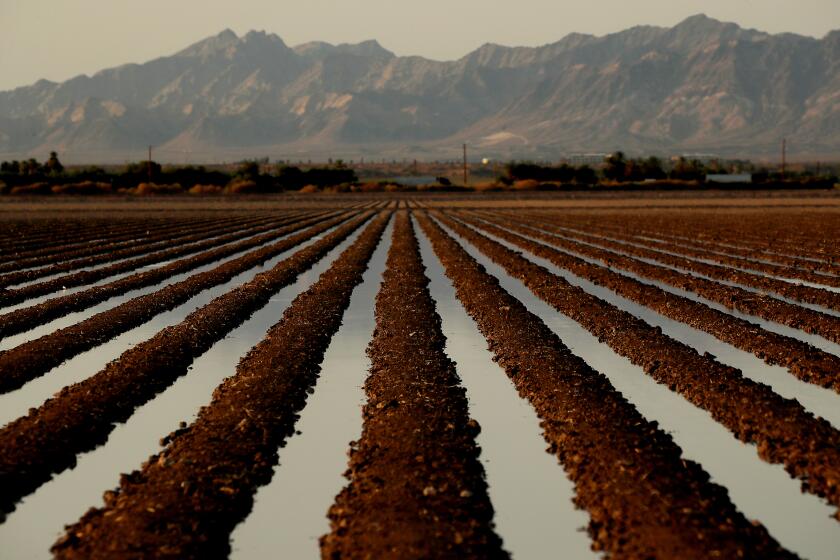
- Share via
- Environmental groups filed a petition calling on the Trump administration to strictly enforce a regulation that requires ‘beneficial’ use of Colorado River water.
- The measure, which could be used to require reductions in agricultural water use, is needed to ensure the long-term viability of the Colorado River, according to the petition by the Natural Resources Defense Council and others.
Environmental groups are demanding that the Trump administration exercise the federal government’s authority to curb wasteful water use in an effort to address the Colorado River’s chronic water shortages.
In a petition submitted Tuesday, the Natural Resources Defense Council and nine other groups called for the U.S. Bureau of Reclamation to enforce a provision of federal regulations stating that water deliveries in California, Arizona and Nevada “will not exceed those reasonably required for beneficial use.”
The petition takes aim in particular at wasteful water practices in agriculture, which accounts for about three-fourths of water diversions from the Colorado River, said Mark Gold, the council’s director of water scarcity solutions.
“There is definitely a great deal of room for improvement in the agricultural sector,” Gold said. One example of waste, he said, is flood-irrigating farm fields year-round in the desert to grow water-intensive crops such as hay.
Alfalfa and other types of hay are used to feed cattle and other livestock, and in recent years they have been exported in growing quantities to China, Saudi Arabia and other countries.
“The export of these water-intensive crops is akin to exporting water itself, a resource that is urgently required domestically,” leaders of the environmental groups wrote in the petition. They added that much of the Southern California farmland that relies on Colorado River water is “either fully or partially irrigated via flood irrigation, which uses much more water than drip and sprinkler irrigation.”
Much of the Colorado River’s water is used for agriculture. A new study shows 46% of the water that is diverted is used to grow hay to feed cattle.
Farmers and managers of agricultural water agencies, such as California’s Imperial Irrigation District, have taken part in water-saving programs. Growers have said they are willing to shift to more water-efficient irrigation systems to free up water and boost reservoir levels, so long as they are paid enough to help foot the bill.
Those in agriculture, however, also have pointed out that in many areas they hold water rights dating back more than a century, which entitles them a higher priority in allocations and cutbacks. And many farmers have said they would oppose schemes in which a government agency might attempt to dictate which crops they plant.
Leaders of the groups that submitted the petition — among them Los Angeles Waterkeeper, Orange County Coastkeeper and the Utah Rivers Council — suggested in it that the government should also consider wasteful water use in cities and industries.
They pointed to the watering of purely ornamental grass in cities, as well as “inefficient industrial processes that use more water than needed due to outdated evaporative cooling systems.”
The Colorado River provides water for cities from Denver to Los Angeles, 30 Native tribes and farming communities from the Rocky Mountains to northern Mexico.
Gold called the “beneficial use” provision “a very important tool in ensuring a sustainable future for the Colorado River, and the 40 million people who rely on it.”
“The Bureau of Reclamation has the authority and obligation to stop the waste and protect this precious resource,” he said.
The river has long been overused, and its reservoirs have declined dramatically amid persistent dry conditions since 2000. The average flow of the river has shrunk about 20% since 2000, and scientists have estimated that roughly half of that decline has been caused by global warming driven by the burning of fossil fuels.
Lake Mead and Lake Powell, the river’s two largest reservoirs, are both 33% full.
The seven states that rely on the river are under growing pressure to negotiate new rules for dealing with shortages after 2026, when the current rules expire. But those talks have been at an impasse, with persistent disagreements pitting representatives of the three states in the river’s lower basin — California, Arizona and Nevada — against the four states in the river’s upper basin — Colorado, Utah, Wyoming and New Mexico.
Some water managers and experts have previously suggested that the federal government should secure necessary water cutbacks by laying down a definition that separates “beneficial” use of water from “unreasonable” water waste. The environmental groups’ legal petition is thought to be the first such attempt to compel federal officials to act on that authority.
“The water levels of the Colorado River are dwindling due to climate change, and this trend is expected to persist and worsen,” the environmental groups said in the petition, adding that unless the federal government changes its approach to water deliveries in California, Arizona and Nevada, where the regulations apply, “the growing disparity between supply and demand will lead to a severe crisis.”
States that rely on the Colorado River are at an impasse in talks on rules to address water shortages. California, Arizona and Nevada are at odds with other states.
Much of the Colorado River’s water is used for agriculture. In a study published last year, researchers found that alfalfa and other cattle-feed crops consume 46% of the water that is diverted from the river, accounting for nearly two-thirds of agricultural water use. The research also found that agriculture is the dominant user of Colorado River water, accounting for 74% of the water that is diverted.
The petition focuses on a federal regulation titled Part 417, which requires the Bureau of Reclamation to ensure that its deliveries of water in the three lower basin states “will not exceed those reasonably required for beneficial use.”
“Our findings are that the Bureau is not adhering to this requirement,” said Cara Horowitz, director of UCLA’s Frank G. Wells Environmental Law Clinic, which is representing the groups.
“We hope the Bureau will see the urgency of improving its water delivery process to avoid wasting Colorado River water, especially given how constrained our supply is,” Horowitz said in an email. “But if it doesn’t, we’re prepared to consider next steps, including litigation.”









